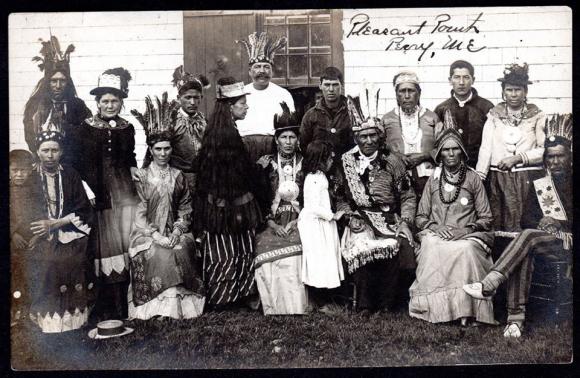Passamaquoddy History – A Brief Look Back
The Passamaquoddy Tribe is an indigenous Native American tribe of eastern Maine, the easternmost tribe in the United Sates. Culturally, the Passamaquoddy are one of several tribes of the Wabanaki (dawnland) group. The ancestral home of the Passamaquoddy Tribe covered the entire St. Croix River watershed, in Washington County, Maine, and adjacent New Brunswick, Canada, an area in excess of three million acres. The Tribe used an elaborate network of rivers, lakes, and portages to trade with other Indian tribes in New England, the Maritime Provinces of Canada, and beyond. Currently, the Passamaquoddy Tribe is located on two reservation communities, Indian Township and Pleasant Point in Maine and a community in New Brunswick Canada. It was our custom to follow the seasons and the migration of the animals and fish. In the winter we lived in the deep forest to hunt the large game animals, in the Spring we gather at the first waterfalls of the river system to catch the large runs of salmon, in the Summer we live along the coast to gather shellfish and fish in the deep ocean, and in the Fall we follow the large game during the rut or mating season.
The Passamaquoddy language is of the Algonquian language family. The language is officially known as Passamaquoddy-Maliseet, the latter variant being spoken in New Brunswick, in the watershed of the St. John River.
By 1755, the Passamaquoddy Tribe was one of only a few tribes still residing in Maine, many of the others having been forced to flee into Canada because of their allegiance to the French during the French and Indian wars. Within two hundred years after the establishment of the first non-Indian settlements in the region, the Passamaquoddy Tribe had been reduced by war and disease to a fraction of its former size. A census taken in 1812 enumerated only 360 persons.
The Passamaquoddy supported the Americans in the Revolutionary War, largely on the basis of promises and assurances made by General George Washington in a 1777 letter. Once the war was won, however, these commitments were forgotten. Early agreements with the Passamaquoddy Tribe were never ratified by Congress, and repeated petitions for federal aid were rejected. The Passamaquoddy Tribe fared little better under the stewardship of the Commonwealth of Massachusetts or, after 1820, under the new State of Maine. Unable to understand the economic and cultural basis of Passamaquoddy life, the state governments took Indian lands and sold timber in exchange for promises to provide for the maintenance of Tribal members.
By the mid-1830s, the Passamaquoddy Tribe had been deprived of almost all of its aboriginal territory. The tribe retained possession of only a 100-acre block of land along Passamaquoddy Bay in eastern Maine (Pleasant Point) and 23,000 acres of forest land on the west branch of the St. Croix River (Indian Township). State-appointed Indian agents exercised total control over the dispensing of food, clothing, shelter, health care, and other necessities. For many generations, the Passamaquoddy people lived at a bare subsistence level.
Not until two hundred years after the Revolutionary War did the Federal Government acknowledge its obligation to the Passamaquoddy. Congress, in 1790, had passed legislation to curtail exploitation of Indian lands (the Indian Trade and Intercourse Act). Since the United States historically took no action against states for violations of the Act, the legal presumption arose that Maine Indians were not protected by this legislation and that the Federal Government had no responsibility towards them.
In 1975, a United States District Court ruled that the Non-Intercourse Act applied to Maine's two tribes, the Passamaquoddy and the Penobscot (Passamaquoddy v. Morton). This ruling established a trust relationship with the United States; the court ordered the federal government to litigate a claim against the State of Maine for damages arising from the illegal taking of Indian lands. The subsequent negotiated settlement of this case, culminating in passage by Congress of the Maine Indian Claims Settlement Act (PL 96-420) in 1980, marked a critical turning point in the history of the Passamaquoddy Tribe.
The land claim settlement, however, created a unique situation for the Passamaquoddy. By virtue of the Act and its accompanying state legislation (the Maine Implementing Act), the Passamaquoddy Tribe has both the sovereign status of a federally recognized Indian tribe and a unique status within Maine law.
During the years since the land claims settlement, the Passamaquoddy Joint Tribal Council has met the challenge to establish the basic governmental services, physical infrastructure (roads, sewer, water, housing, and schools), and human and social services already in place decades earlier in most of the nation's Indian tribes as a benefit of Federal recognition. At the same time, the Tribe has been challenged to address complex issues of Tribal rights and responsibilities arising from its legally imposed status as a Maine Indian Tribe. It is noteworthy that this rapid growth in policy making and administrative capability has taken place within the context of significant demographic changes resulting from the land claims settlement. Both reservations grew significantly from off reservation returnees who often had intermarried, could not speak Passamaquoddy, and who had had little contact with the culture. Yet during this period of rapid changes, there have been significant and complementary efforts to foster and support the preservation and resurgence of Tribal culture and language both from the grass roots and from official Tribal initiatives.
Our Tribal population today is 3,600 people and only 12% are fluent speakers, this has been a dramatic change in the last 30 years, where 70% were fluent speakers.

The Passamaquoddy Tribe Today
As of 2018, Passamaquoddy Tribal membership totaled 3,600, an increase of 8.2% since 1990. The total number of people living on the reservation at Pleasant Point is 850 members, with 800 on the reservation at Indian Township. A similar number of Passamaquoddy people live off the reservation. The ranks of Tribal elders are increasing and marked changes in the number of young Tribal members in recent years will result in a much larger elderly population in the future.
In 2010, the per capita income for reservation residents was $10,472, or only 69% of the per capita income for Maine. Although the tribe’s per capita income has improved relative to Maine’s during the decade, the relative median family and household incomes have worsened. According to the Indian Township Comprehensive Plan for 2014, “Nearly 1/2 of all individuals in Indian Township live below the poverty level, and the mean income is 1/3 less than that of Washington County.” Also, by 2010, the poverty rate at Pleasant Point and Indian Township had almost doubled (37%), while off the reservation the proportion of the population in poverty remained virtually unchanged. More telling is the fact that more than 46% of all on-reservation children now live in poverty, compared to only about 16 % in the rest of Maine. The difference is similar for all age groups. These figures underscore the combined impacts of historically limited employment and educational opportunities for Tribal members, resulting in increased out migration, that in turn lessens intergenerational cultural continuity and the ability to address the economic problems facing the community.
In 2018, the Tribe has entered a new era of Tribal business development, expansion of the Tribal blueberry operations producing over 6 million pounds of berries annually and also the addition of a Tribal Maple Syrup operation in the mountains of western Maine. An era of renewed cultural growth and education has arrived.
